Russia Is Only Winning Inside Trump’s Head
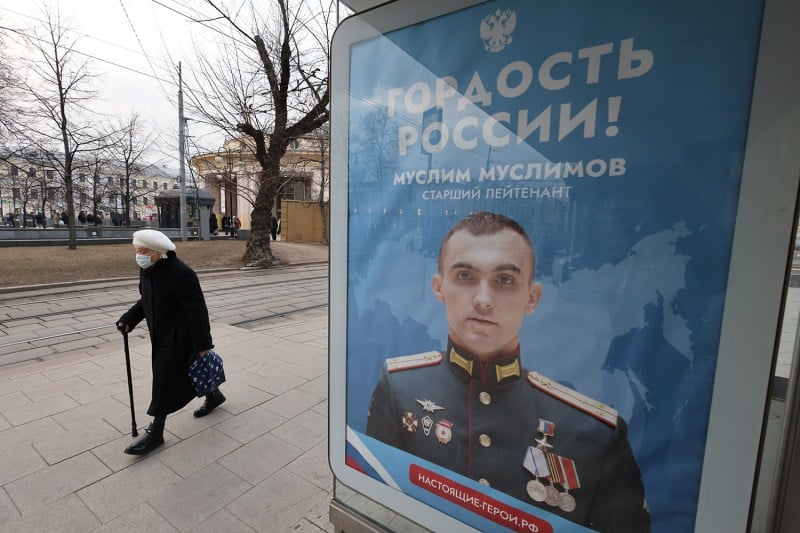
Russia Is Only Winning Inside Trump’s Head
As Russians will tell you, the reality on the ground looks very, very different.
A woman walks past an advertisement for the Russian army in Moscow on Feb. 14, 2024. Contributor/Getty Images
As Yale University historian Timothy Snyder recently posted on X, “The only war that [Russian President Vladimir] Putin is winning is inside [U.S. President Donald] Trump’s head. Putin only wins the war on the ground by setting American policy, through Trump.”
And, boy, is Putin succeeding. What transpired between Trump, U.S. Vice President J.D. Vance, and Ukrainian President Volodymyr Zelensky in the Oval Office on Feb. 28 was remarkable—not only for the undiplomatic blow-up, but for the clarity it provided on how Trump and his surrogates view the war. The most persistent among their views is the idea that Ukraine is rapidly losing the war to an unstoppable Russian army and that the only way out of this is to give in to Putin’s demands.
As Yale University historian Timothy Snyder recently posted on X, “The only war that [Russian President Vladimir] Putin is winning is inside [U.S. President Donald] Trump’s head. Putin only wins the war on the ground by setting American policy, through Trump.”
And, boy, is Putin succeeding. What transpired between Trump, U.S. Vice President J.D. Vance, and Ukrainian President Volodymyr Zelensky in the Oval Office on Feb. 28 was remarkable—not only for the undiplomatic blow-up, but for the clarity it provided on how Trump and his surrogates view the war. The most persistent among their views is the idea that Ukraine is rapidly losing the war to an unstoppable Russian army and that the only way out of this is to give in to Putin’s demands.
Time and time again during the exchange at the White House, both Trump and Vance attempted to hammer this idea into Zelensky, telling him that “you don’t have the cards right now,” “you’re not winning this,” and “your country is in big trouble.” Since then, Trump has doubled down on social media, posting that “Russia is absolutely pounding Ukraine on the battlefield right now.”
These claims do not correspond to the reality on the ground, but they are exactly what Putin needs Trump to think. For Putin, the narrative of an inevitable Russian victory makes it appear invincible in Western eyes and, more importantly, spreads the idea that any assistance to Ukraine is futile and merely prolongs the war. As Trump gifts Putin with unrequited concessions, including the suspension of military aid and intelligence sharing with Ukraine, it’s becoming clearer that Washington has joined Moscow’s side.
Trump is making his claims at a time when Russia’s actual advance—rather than the imaginary one in his head—has stalled in key contested areas. According to DeepState, a Ukrainian project mapping the course of the invasion, the Ukrainian military has taken back several occupied areas in local counteroffensives in recent days. One of these areas is Pokrovsk, a city that Russian forces have been unsuccessfully attempting to capture since last August. Mikhail Zvinchuk, a former Russian Defense Ministry spokesperson who now runs Rybar, a popular pro-war Telegram channel with more than 1.3 million subscribers, reported in his latest front-line dispatch that Russian forces have suffered a number of painful setbacks in Toretsk, a mining town in Donetsk Oblast that Moscow declared as “liberated” in early February. There are similar reports about Chasiv Yar, another front-line city where the Russians have been bogged down.
The stalled Russian army is a shadow of its former self. Its most capable and elite units are long gone, ground down by fierce Ukrainian resistance in the first few weeks of the war. Stocks of tanks, armored vehicles, and even trucks are perilously low; Russian soldiers at the front have increasingly resorted to donkeys and horses to move supplies.
Worse, the small gains Russia has made over the past year and a half have come at a terrible loss of life. At the time of writing, open-source data confirms close to 96,000 regular Russian troops have been killed in action, with the likely real number to be at least 160,000. Adding the seriously wounded brings Russia’s irrecoverable combat losses to an estimated 550,000, according to recent report by the International Institute for Strategic Studies. There are drone videos of Russian soldiers limping on crutches or crawling on stumps of their legs toward the Ukrainian positions. Their final mission: to act as bullet sponges that reveal Ukrainian fire nests.
The reality on the front has nothing to do with the Kremlin narrative of an infinitely resourced Russia on a relentless, unstoppable march—a narrative that has been swallowed hook, line, and sinker by Trump and the MAGA movement.
Official Russian media is still full of bombastic triumphalism, but Russians who are closer to the war do not see their country as winning—or capable of winning by military means alone. Ilya Mersh, a pro-war blogger with deep ties to Russia’s top military command and about 600,000 subscribers on Telegram, directly contradicted Vance on Ukraine. On Feb. 20, Mersh wrote, “Vance claims that Russia has an overwhelming advantage in manpower and equipment, and that Ukraine doesn’t stand a chance. Let’s take a closer look at that. Throughout this entire war, we’ve never actually had a numerical advantage in troops—at some points, we were even outnumbered.”
Yuri Kotenok, one of the most prominent front-line war bloggers, wrote on Telegram that “the Ukrainians are becoming bolder by the day, counterattacking and even pushing us out of several defended positions.” He complains about “a severe shortage of troops for assault operations” in southern Donetsk.
To find fresh recruits, the Russian army has long been scraping the bottom of the barrel. Anastasia Kashevarova, another passionately pro-war blogger, explained that people with severe physical handicaps, mental health issues, and drug addictions are being tricked into signing up.
Igor Girkin, one of Russia’s most prominent and vocal pro-war nationalists, now serves a prison sentence for his criticism of Putin for not pursing the war relentlessly enough. In a note from prison, he recently wrote that the war is lost. Russia has not reached any of its strategic goals, he said, and Ukrainian forces have stood as equals to the Russian army. According to him, the country’s failure in the war means its entire future is now bleak. “The systemic crisis in which our country finds itself still has no prospect of resolving and will deepen,” Girkin concluded.
Some of the most passionate pro-war Russians are grappling with the grim realization that the war is not the grand historical struggle they envisioned, but a slow, grinding catastrophe. Modest Kolerov, an ultranationalist blogger and former Kremlin spin doctor, lamented in a widely shared post that the war “has proven beyond doubt that ‘New Russia’ is nothing more than … a pale shadow of historical Russia—whether the Russian Empire or the Soviet Union.” This sentiment, once confined to the opposition, is now creeping into the rhetoric of the pro-war camp itself.
These are all telling signs of just how far the Kremlin’s narrative has unraveled. But perhaps the best indication of the shifting mood over the war inside Russia is a video that has gone viral on Telegram. Originally appearing on a Russian account with more than 1 million subscribers, it shows Russian soldiers freezing in a trench, desperately awaiting news of a cease-fire. Unlike earlier propaganda pieces that framed the war as a patriotic duty or a lucrative adventure, this video invited sympathy for the exhausted, war-weary troops.
If Russia has a chance of winning this war, it will not be because of its military achievements on the battlefield. It will be because Putin has convinced Trump, Vance, and their MAGA acolytes that Russia holds all the imaginary cards.
This post is part of FP’s ongoing coverage of the Trump administration. Follow along here.
Alexey Kovalev is an independent journalist and former investigations editor at Meduza who left Russia in 2022. X: @Alexey__Kovalev
More from Foreign Policy
-

Samuel Huntington holds his hand to his chin while sitting in an office. Samuel Huntington Is Getting His Revenge
The idea of a global “clash of civilizations” wasn’t wrong—it was just premature.
-

U.S. President Donald Trump meets with Ukrainian President Volodymyr Zelensky at the White House on Feb. 28. The Perils of a Reality TV Presidency
The Trump-Zelensky shouting match is a reminder that international diplomacy was never meant to be carried out in front of billions of eyes.
-

A Ukrainian serviceman trains in the woods near the frontline in Ukraine. Three Years On, What’s Next for Europe and Ukraine?
Nine thinkers on the bombshells coming out of Washington.
-

Donald Trump is seen inside a helicopter at night looking down at a cell phone Trump’s New Map
America’s first post-literate president has only geography to fall back on.

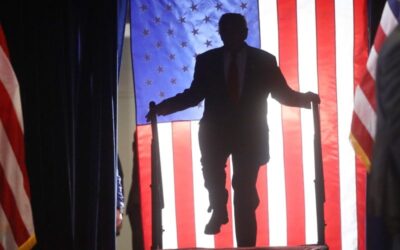
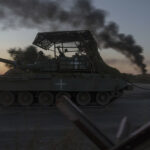



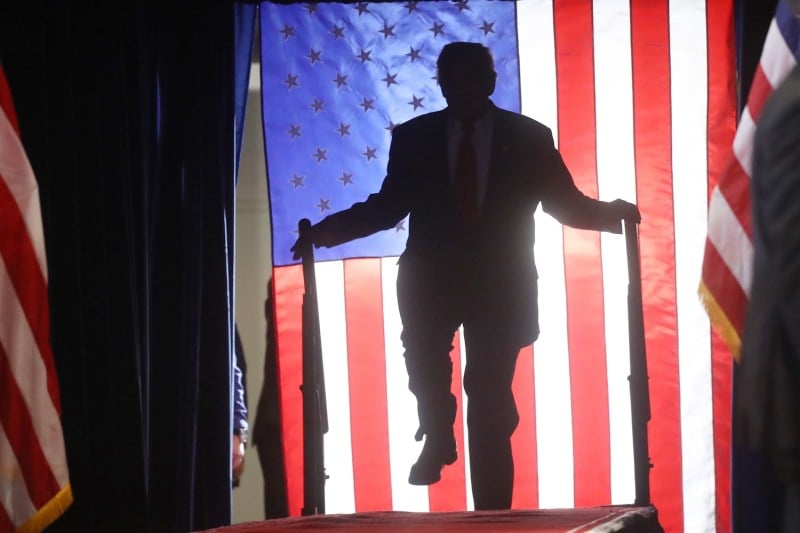
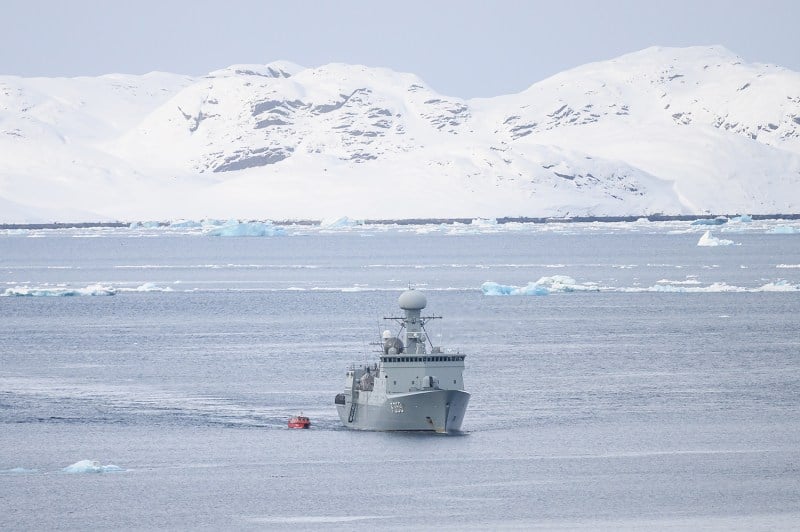


Join the Conversation
Commenting on this and other recent articles is just one benefit of a Foreign Policy subscription.
Already a subscriber?
.
Subscribe
Subscribe
View Comments
Join the Conversation
Join the conversation on this and other recent Foreign Policy articles when you subscribe now.
Subscribe
Subscribe
Not your account?
View Comments
Join the Conversation
Please follow our comment guidelines, stay on topic, and be civil, courteous, and respectful of others’ beliefs.
Change your username |
Log out
Change your username:
CANCEL
Confirm your username to get started.
The default username below has been generated using the first name and last initial on your FP subscriber account. Usernames may be updated at any time and must not contain inappropriate or offensive language.